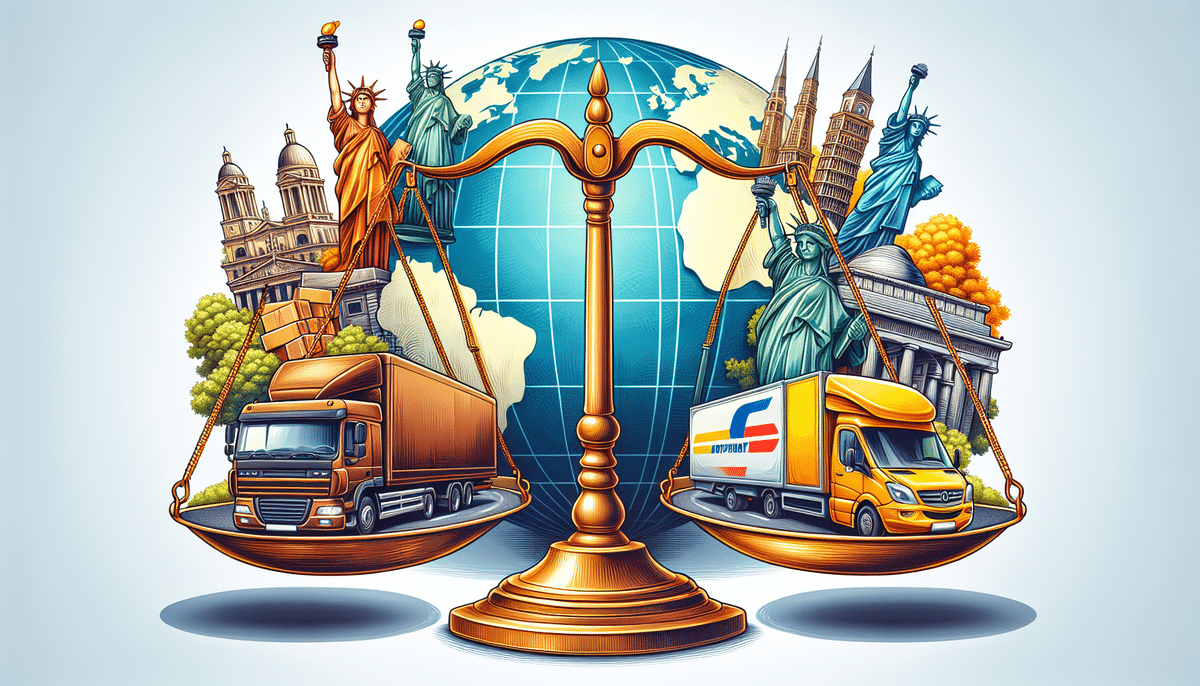UPS (United Parcel Service) vs DHL eCommerce: A Comprehensive Comparison
In the competitive world of shipping and logistics, choosing the right carrier is crucial for business success. Two industry leaders, United Parcel Service (UPS) and DHL eCommerce, offer a range of services tailored to different business needs. This comparison delves into their offerings, pricing, reliability, and more to help you make an informed decision for your business.
Overview of UPS and DHL eCommerce
UPS is a global powerhouse in logistics, renowned for its extensive network and comprehensive range of services, including freight forwarding, customs brokerage, and supply chain management solutions. According to Statista, UPS held approximately 33% of the U.S. package delivery market in 2023.
DHL eCommerce, a division of Deutsche Post DHL Group, specializes in e-commerce shipping solutions. It leverages a network of third-party delivery partners to offer cost-effective and scalable shipping options for online retailers. DHL eCommerce serves over 220 countries and territories, making it a formidable player in international shipping.
Shipping Rates and Cost Analysis
Shipping costs are a pivotal factor for businesses when selecting a logistics provider. Both UPS and DHL eCommerce offer competitive pricing, but their structures cater to different needs.
- DHL eCommerce is generally more cost-effective for shipping small to medium-sized packages, making it ideal for e-commerce businesses with high volume but lightweight items.
- UPS tends to be more economical for larger and heavier shipments, offering scalable solutions that can handle bulk orders efficiently.
For example, according to Forbes Business Council, optimizing shipping costs can reduce overall business expenses by up to 15%. It's essential to assess your shipment characteristics and volume to determine which provider offers the best value.
Delivery Times and Reliability
Timely delivery is critical for customer satisfaction and business reputation.
- UPS is known for its fast and reliable delivery services, offering a variety of options including same-day, next-day, and weekend deliveries. According to UPS's annual report, their UPS Next Day Air service boasts a 98% on-time delivery rate.
- DHL eCommerce provides standard and expedited shipping options suitable for less time-sensitive shipments. While slightly slower than UPS, DHL eCommerce maintains a strong delivery reliability with a 95% on-time rate, as reported by DHL Annual Review.
When choosing between the two, consider both the urgency of your shipments and the associated costs to strike the right balance for your business needs.
Tracking Capabilities and Technology
Advanced tracking features enhance transparency and allow businesses to monitor their shipments effectively.
- UPS offers real-time tracking through their website and mobile app, including delivery confirmation and proof of delivery. Their UPS Tracking system provides detailed updates at every stage of the shipping process.
- DHL eCommerce provides an e-commerce dashboard with real-time tracking and visibility into shipment status. Their tracking system integrates seamlessly with various e-commerce platforms, offering businesses streamlined monitoring capabilities.
For businesses requiring robust tracking and accountability, UPS's comprehensive tracking solutions may offer an edge. However, DHL eCommerce's integration with online platforms can enhance operational efficiency for e-commerce retailers.
Global Reach and Specialized Services
Expanding globally requires a logistics partner with extensive international capabilities.
- UPS operates its own fleet of planes and trucks, ensuring fast and efficient shipping. Their established relationships with customs officials can expedite the customs clearance process, reducing delays in international shipments.
- DHL eCommerce leverages a network of local delivery partners to reach over 220 countries and territories. This makes DHL eCommerce particularly strong in handling shipments to less common destinations.
In addition to standard shipping, both providers offer specialized services:
- UPS:
- UPS Worldwide Express: Fast and reliable shipping of large and heavy items with customs clearance and door-to-door delivery.
- UPS My Choice: Customize delivery options and redirect packages to alternate locations.
- DHL eCommerce:
- Fulfillment and warehousing services to manage inventory and order fulfillment efficiently.
- DHL Parcel International Direct: Fast and affordable shipping with end-to-end tracking and delivery confirmation.
Customer Service Comparison
Effective customer service can significantly impact your shipping experience.
- UPS offers dedicated customer service teams with a reputation for responsiveness and support. Their extensive network of physical locations, including drop-off points and retail stores, provides accessible assistance when needed.
- DHL eCommerce excels in international customer service, offering multilingual support and tailored solutions for businesses expanding globally. Their online platform is user-friendly, facilitating easy management of shipments and inquiries.
Customer experiences may vary, so it's advisable to review customer testimonials and ratings to gauge the quality of service each provider offers.
Pros and Cons for Business Use
Choosing between UPS and DHL eCommerce involves weighing various advantages and potential drawbacks based on your business needs.
Advantages of UPS
- Extensive network of planes and trucks for fast and efficient domestic shipping.
- Established relationships with customs officials for expedited international shipping.
- Comprehensive tracking capabilities and a large network of physical locations.
- Wide range of services including freight forwarding and supply chain management.
Advantages of DHL eCommerce
- Cost-effective shipping options for small to medium-sized packages.
- Extensive global presence in over 220 countries and territories, ideal for less common destinations.
- Affordable international shipping with reliable services like DHL Parcel International Direct.
- Specialized e-commerce solutions including fulfillment and warehousing services.
Considerations
Both UPS and DHL eCommerce offer additional services such as package tracking, insurance, and delivery confirmation. These services provide added peace of mind but may come at an additional cost. Carefully consider which services are necessary for your business and factor in any additional costs when making your decision.
By evaluating your business’s unique shipping needs and considering the factors outlined above, you can make an informed decision on whether UPS or DHL eCommerce is the best choice for your organization.
Conclusion
Both UPS and DHL eCommerce are formidable players in the shipping and logistics industry, each with its strengths and areas of expertise. UPS offers a robust infrastructure and a wide array of services suitable for businesses requiring fast and reliable shipping within the U.S. and internationally. On the other hand, DHL eCommerce provides cost-effective and scalable solutions tailored for e-commerce businesses looking to expand globally. Assess your specific needs, including shipment volume, budget, delivery speed, and global reach, to determine which provider aligns best with your business objectives.






















